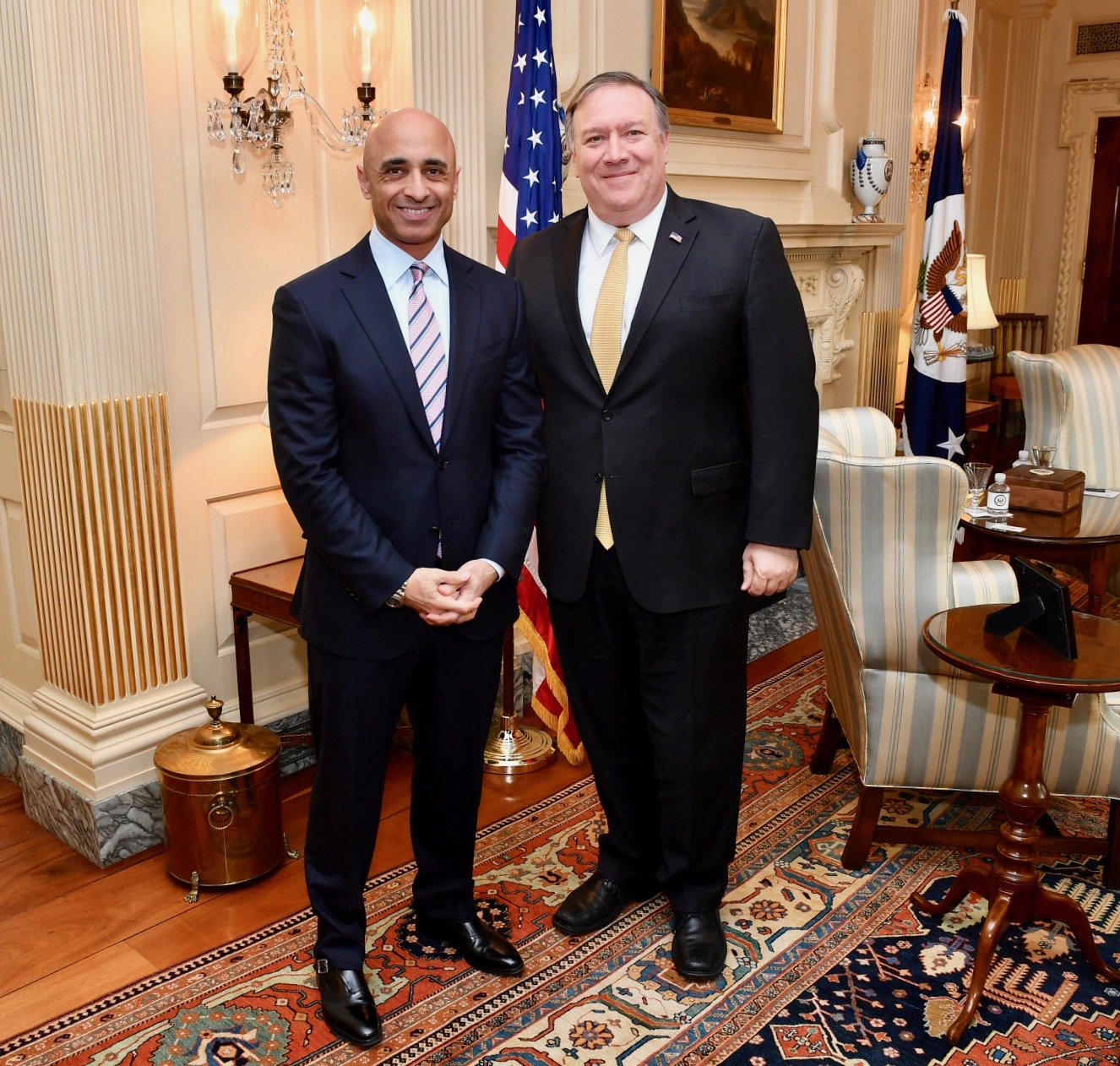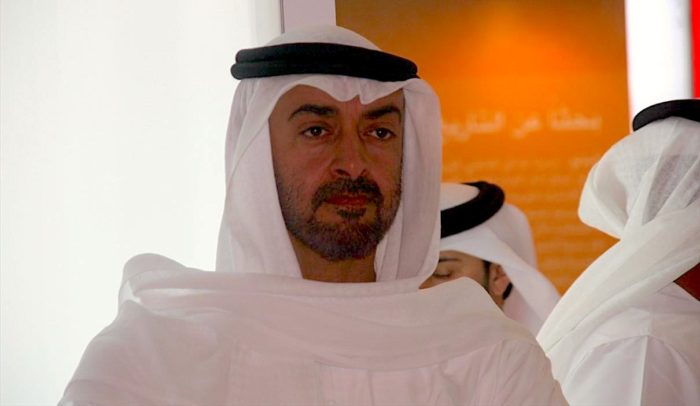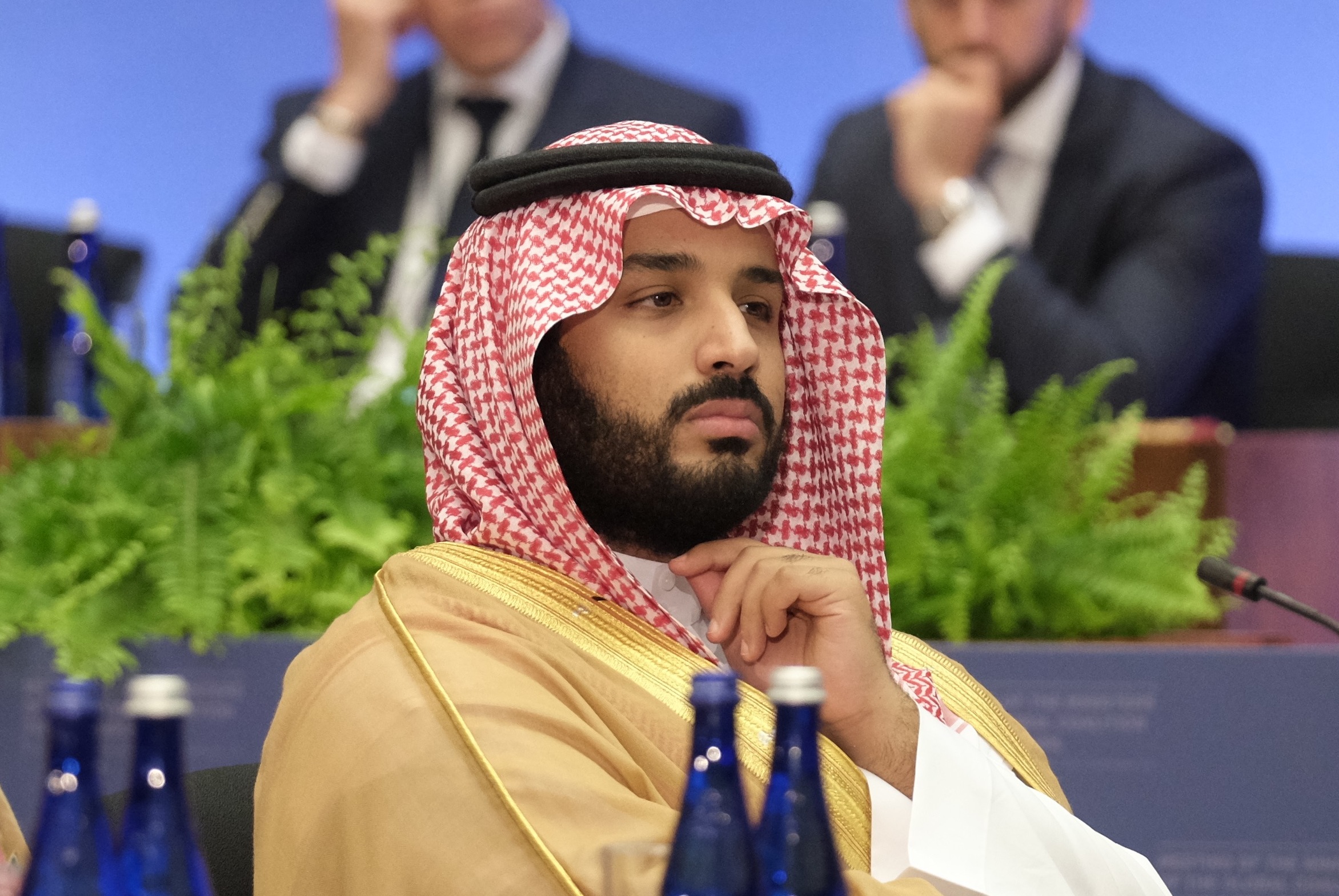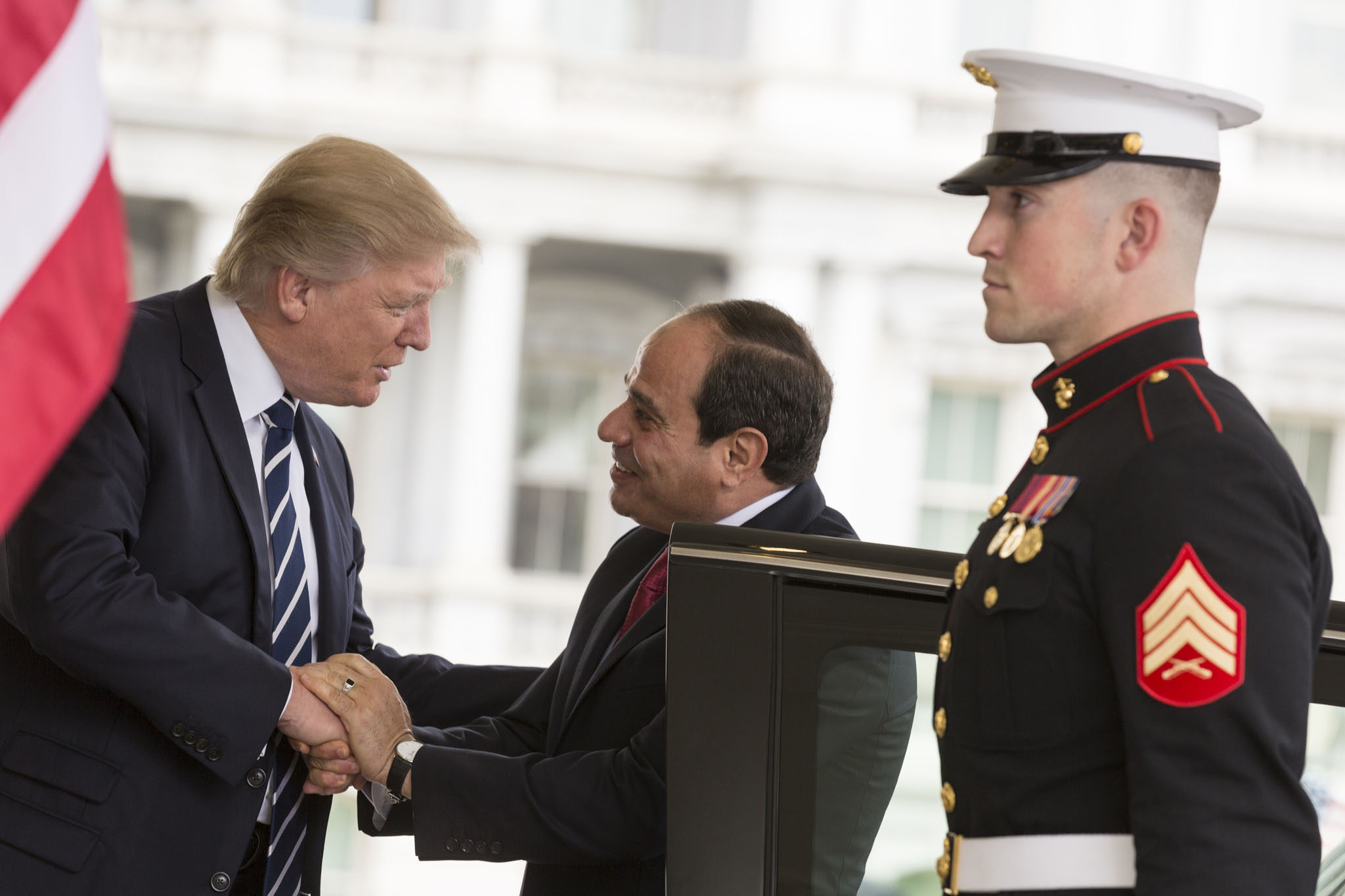As’ad AbuKhalil looks at Gulf rulers vying to play top host to U.S. interests in the Middle East.
By As`ad AbuKhalil
Special to Consortium News
 The political role of the United Arab Emirates has changed dramatically since the death of its founding ruler, Shaykh Zayed bin Sultan.
The political role of the United Arab Emirates has changed dramatically since the death of its founding ruler, Shaykh Zayed bin Sultan.
He was officially succeeded by his son, Khalifah bin Zayed, in 2004 but the latter has been largely distant from governmental affairs for health and other reasons. The actual reins are held by Abu Dhabi’s highly ambitious Crown Prince Muhammad bin Zayed. Muhammad has been the effective ruler, along with his brothers on his mother’s side, Fatimah bint Mubarak, who control all the key posts of government.
The current de facto ruler of Saudi Arabia, Crown Prince Muhammad bin Salman, has largely emulated Muhammad (known commonly as MbZ, while Muhammad bin Salman is commonly known as MbS).
Under Shaykh Zayed, the UAE avoided internal Arab conflicts and steered its foreign policy largely according to the pan-Arab consensus. While the country was charted by the British colonial powers it smoothly made the transition to a strong alliance with the U.S. Despite tensions with Saudi Arabia it mainly avoided open conflicts.
Shaykh Zayed was a loyal ally, or client, of the U.S. and its interests in the region. And while generally deferring to Saudi hegemony, he paid lip service to the pro-Palestinian sentiment of the Arab population. In the early 1970s he even welcomed Leila Khalid, the famous commander of the Popular Front for the Liberation of Palestine, to the UAE and is said to have made a donation to the PFLP (a small subset of which defected after the incident and started their own small organization).
Muslim Brotherhood in Ministries
Shaykh Zayed was uneducated and was not known for speech-making. His country benefited from the educated Palestinian community. He also invited Muslim Brotherhood functionaries to fill various posts in justice and education ministries.
Zayed, for instance, invited Hasan Al-Turabi, the famous Sudanese Muslim Brotherhood leader, to help draft the UAE constitution. This was a time when both the UAE and Saudi Arabia enthusiastically welcomed Muslim Brotherhood leaders and members to combat the tide of secular Arab nationalism and leftism in the region.
In his last year, Zayed increasingly surrendered power to his sons and his last political role was in 2003 when he proposed an initiative according to which Saddam Husain would relinquish power in return for the U.S. backing away from war with Iraq (an initiative in which neither the U.S. nor Saddam showed any interest).
MbZ has taken the UAE in a very different direction. He has clearly wanted to make the UAE a sort of new Arab Israel, which could serve the interests of the U.S. MbZ was interested in military-intelligence affairs and built up his power from that basis.
Please Make a Donation to Our
Spring Fundraising Drive Today!
His rule has been characterized by 1) establishment of covert, but strong relations with Israel; 2) an open war against the Muslim Brotherhood; 3) competition with Qatar and Saudi Arabia for regional dominance, especially after the demise of Saddam’s regime; 4) direct involvement in Palestinian affairs through the agency of Muhammad Dahlan, the notoriously shady Palestinian intelligence figure; and 5) heavy lobbying in Washington, with disregard for Arab public opinion on all matters.
MbZ was not satisfied with being one of many loyal allies/clients of the U.S. in the Middle East. He has sought to rival Israel in serving as a strategic partner of the U.S. in the region and outdo Jordan in providing intelligence and military services. His military emphasizes special forces and hosts one of the biggest U.S. intelligence stations in the world. MbZ also invested in buying influence in Washington.
Intense D.C. Courtship
The role of his D.C. ambassador, Yousef Al-Otaiba, who courted journalists, officials, and think tank experts with unprecedented intensity, has become well-known. UAE money flowed into think tanks, and the UAE received favorable coverage in Western media. It also helped that Al-Otaiba established a strong friendship with the Israeli ambassador and the Israeli lobby began to promote both Saudi and UAE regime interests in Washington, after both regimes had abandoned a verbal commitment to the Palestinian cause.

UAE’s Al-Otaiba with U.S. Secretary of State Michael Pompeo in D.C. March 29, 2019. (State Department/Michael Gross)
Arab lobbies — no matter what states or interests they represent, no matter how well-funded they are — can’t achieve great success without the blessings of the Israeli lobby.
The AWACs sale to Saudi Arabia during the Reagan years was an exception: a time when the Saudi regime — supported by a different Republican Party prior to the rise of the Evangelical Zionists — prevailed against the Israeli lobby.
The Saudi and UAE regime took a back seat to Qatar in 2011 and 2013. For the first few years of the Arab uprisings, Doha was in the driver’s seat. The Saudi King, Abdullah, was too feeble to run the affairs of his own government, let alone the affairs of the Arab regional system. Qatari foreign ministers ran the Arab League in the first few years after the Arab uprisings and arranged for the ouster of Syria from the Arab League.
Qatar, after all, was celebrating the victory of its allies in the Muslim Brotherhood in Tunisia, Libya and most importantly Egypt. They also were on the ascendancy in Yemen. The Arab counter-revolution was in Doha’s hands during this time: the Qatari regime was making sure that the popular protests didn’t get out of hand and didn’t disturb the Arab regional system.
The Qatari regime also negotiated a deal between the local Muslim Brotherhoods and the Israeli lobby in Washington, according to which the Egyptian Muslim Brotherhood would not challenge the Egyptian-Israeli treaty, and the Tunisian Muslim Brotherhood would stop an article criminalizing normalization with Israel, which was high on the protesters’ agenda, from entering the new constitution.
Quietly Sponsoring a Coup in Egypt
But the UAE was not dormant during those times. It was quietly sponsoring a coup in Egypt against the Muslim Brotherhood, and preparing for an open war against it throughout the Arab world, in every country where the Brotherhood may have had a chance of electoral success.
The UAE created a front (the Egyptian youth movement, Tamarrud) and worked with Egypt’s General Abdel Fattah el-Sisi to oust the first freely elected president in the country’s history.
It also supported the relics of the ancien regime in Tunisia, and sponsored Gen. Khalifa Haftarin in Libya. In 2015, when Salman ascended the Saudi throne, MbZ became the chief counsel and advocate for Salman’s son MbS in Washington.
The two seemed to agree on the need to expel Qatar from the affairs of Arab politics and to engineer together a tougher war on Iran. They both launched — with Western support — the war on Yemen assuming, wrongly, that it would be over in a few weeks.
The current era in Arab politics is largely the design of MbZ with the enthusiastic support of MbS. But the two personalities are quite different. While MbS is flashy and outspoken, MbZ keeps a low-profile. MbS likes to impress Western audiences (and he succeeded in doing that until the murder of Jamal Khashoggi last year). MbZ, by contrast, only cares about impressing the White House and his interlocutors in Tel Aviv.
MbZ is now trying to influence events in Sudan and Algeria where he maintains close ties to the ruling militaries and wants to prevent democratic rule in both countries. Protest signs against UAE and Saudi intervention were visible in Sudanese demonstrations that led last month to the fall of President Omar al-Bashir (MbZ intelligence advisor, Muhammad Dahlan, visited Sudan the other day).
In Yemen, MbZ has been quite assertive and even clashed with the Saudi regime to promote his own clients there. The ability of MbZ to continue playing his leadership role on behalf of the U.S. and Israel may not last forever. In the meantime, however, MbZ has emerged as Israel’s enforcer in the region; a role that is bound to earn him accolades in Washington, and especially on Capitol Hill.
As’ad AbuKhalil is a Lebanese-American professor of political science at California State University, Stanislaus. He is the author of the “Historical Dictionary of Lebanon” (1998), “Bin Laden, Islam and America’s New War on Terrorism (2002), and “The Battle for Saudi Arabia” (2004). He tweets as @asadabukhalil
Please Make a Donation to Our
Spring Fundraising Drive Today!




It amazes me to see how many times U.S. politicians are pictured standing on beautiful antique Persian carpets without seeing the irony. The carpet in the photo where Al-Otaiba is standing next to Mikel Pompeo is an antique Heriz from the area of northwest Iran known as Azerbaijan, which gets its name from the Turkic speaking Azeris that form a large part of its population. It should not be confused with the Azerbaijan of the same name, which it borders. But then Iran is only known for its oil by these cultural philistines, not for its history, art and culture.
Isn’t it strange how you never get any campaigns for “democracy” in places like the UAE from all the Soros NGOs and the National Endowment for Democracy? Strange, that. You don’t even get Victoria N0uland handing out her cookies. Strange how they are never troubled by ISIS or the MEK or all the other Takfiris. Strange, that one.
I lived there for fourteen years, observed a variety of economical to political aspects of life there and see UAE as a cork on the waves. It will, sooner or later, disappear and vanish, as have many politicians and states that have no roots in their lands and neighborhood. Those who rely on external powers are obviously used and abused, not loved or cared for.
The house of Saud must avoid the temptation to acquire nuclear weapons. The Saudi Arabian-Pakistan alliance is the perfect answer to Zionist-Western Occident designs for global dominion and at the same time (at least partially) removes the nuclear proliferation threat throughout the middle east and beyond. I’d rather be a witness to endless struggles between sovereign central banks, competing fiat currencies, gold vs fiat vs Crypo, than the horror of regional nuclear war. North Korea symbolizes the danger all of humanity faces from a new generation of weapons merchants, criminal enterprises involved in high tech nuclear know how such as A.Q. Khan like networks. If this formidable foe cannot be halted by UN diplomacy, Western Intel operatives nor by international policing agencies such as INTERPOL or FBI, then, those countries who sought out the “Khan” merchants will either surrender Atomic weaponry or be liquidated by the last sheriff in town, the armed forces of the U.S of A. President Trump, you have the right idea, don’t renege now!
Just unfortunate that the genocidal Zionist Apartheid Regime didn’t resist that temptation as well. Instead it was given a huge illegal nuclear arsenal of 400 warheads targeted at all its neighbours. Maybe the really urgent task is to defang Nuttyyahoo of his nuclear toys. Though people like you are probably quite okay with your Chosen People buddies blowing up the planet. That’s quite fine so far as the Exceptional And Indispensable People are concerned.
Certainly an interesting perspective.
We need such unified chapters to grasp the complexity of Mideast politics, showing the motives, factions, and principal actors, the facts without bias or ideology.
For example, Dreyfuss’ Devil’s Game teaches well of WWII-to-1980s US ME policy corruption by mad anti-communism (but omits all mention of the predominant zionist influence). US support of ME tyrants and extremists is a primary cause of the defeat of ME secularism and democracy. Always there is the excuse (security or economy) and the reality of secret agendas and bribes.
We much need to know of the cashflows to US elections and mass media, by all paths. These are the motives of the US tyrant opportunists, invariably traitors to any principles they declare.
I try to keep up with this, but this very well written piece is mind boggling. It reads like the plot outline for the Thomas Pynchon version of the great Arab novel. It is a dreadfully sad picture.
Hard to believe there is only one comment so far on this excellent piece. Thank you Professor for providing all that regional historical background, though after all this time I still struggle to understand the ideology and pursuits of the Muslim Brotherhood.
To something I do possibly understand though. You wrote: “MbS likes to impress Western audiences (and he succeeded in doing that until the murder of Jamal Khashoggi last year)” My take on that incident goes something like this, and don’t know if I’ve heard anyone quite put it like this:
The killing of Khashoggi, open, brazen, and notorious was meant to be all those things. In his culture this form of flexing power is understood and “respected,” for lack of a better word. Shorn of pretense and denial. MbS indeed likes to impress Western audiences, in this case the holders of US power that brazenly, openly, and notoriously kill on a far grander scale. His error was that too many US “subjects” believe that we operate out of love of freedom, democracy, fairness, and justice, and even if we don’t all actually believe that, the gatekeepers (the MSM) go into overdrive to maintain that this indeed is our purity of spirit.
In short MbS misread his audience, or that audience that would be witness to all the grizzly details. He was not within the opaque and shrouded confines of his cultural kingdom. It was the Trump administration that tried to put a smiley face on this over here, probably telling MbS in private “Oh, you little devil you, we must send you off to finishing school.”
But that incident is but a blip on the longer picture, which as you have painted continues to be after all these centuries a sordid collection of petty potentates and “royals” playing at king of the hill and raiding each other in the night. Some will always rise above the others to grasp the golden ring, and MbZ sure does love him some Uncle Sugar.
I miss Assad blog si much,I read it every day
Will come back ?
I doubt it. This is my alternative along with Twitter
I’ll tell you what is amazing is how the blind the man with perfectly good vision can be.
Or maybe it’s not blindness but ignorance of the history of the region. Especially the history of the involvement of U.S., British and French in the region. That is of course unless you are native to the region.
The problem is obvious. The UAE isn’t willing to conform to the bull shit lives the neo-conservatives what them to lead. Good for them.
What seems to be consistently overlooked in UAE reporting, is the constant trading of goods to Iran despite international sanctions. The quayside at Dubai is always chock full of motorised Dhows fully loaded readying to sail to Iran.
Amazing what cosy deals can achieve when blind eyes are turned…_
It’s called normal trade with your neighbours, DUK. Like every country in the world. Though creatures of your ilk are probably quite happy with genocidal economic strangulation that kills hundreds of thousands of children, just “a price worth paying.” People like you need to watch your children starve to death in front of you or die for lack of basic medicine. I wouldn’t want to see your kids getting a mouthful of food or some medicine from these “cosy deals.” “If they want their people to eat, they have to do as they’re told.” One day soon Exceptional Uncle Sam is going to get what’s coming to him. Can’t come soon enough.
No it’s more than normal trade, it’s the power blocks in the ‘west’ not enforcing their hypocritical war on terrorism. I have no problem with Iranians getting fridges and washing machines by these Dhows. But those operating out of Dubai are just making a mint out of the Iranians , not doing the right thing for them.
The blind eye I refer to is the same blind eye that was turned towards the Saudi political assassination of Jamal Khashoggi…_